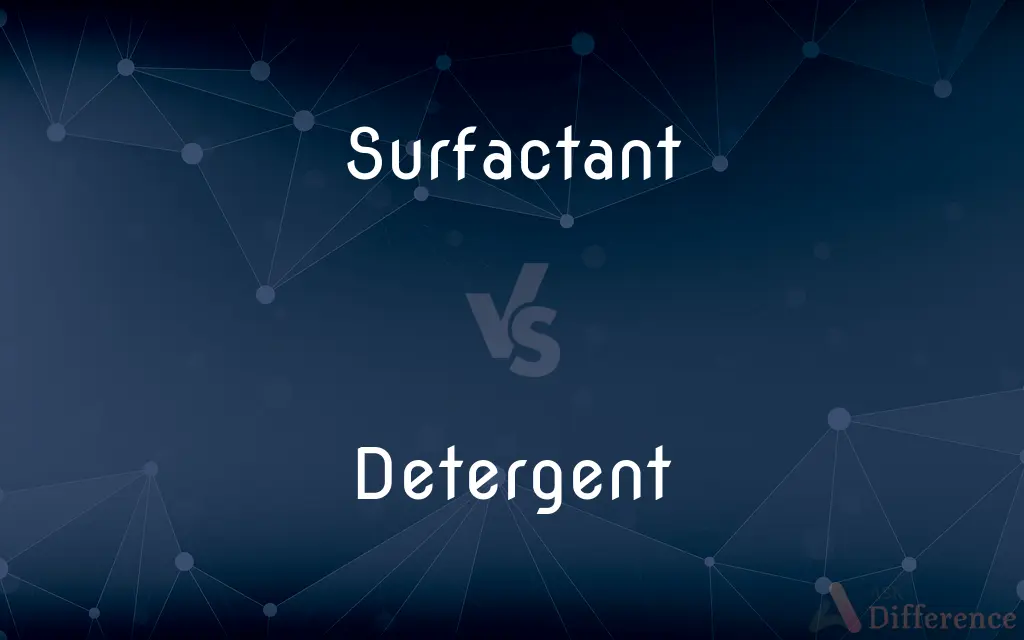Surfactant vs. Detergent — What's the Difference?
By Tayyaba Rehman — Updated on September 18, 2023
Surfactants are compounds that lower surface tension between liquids, while detergents are cleaning agents containing surfactants.

Difference Between Surfactant and Detergent
Table of Contents
ADVERTISEMENT
Key Differences
Surfactants are a broad category of compounds known for their ability to decrease the surface tension between two liquids or between a liquid and a solid. Detergents, on the other hand, are specific types of cleaning agents that utilize the properties of surfactants to remove dirt and grease.
The primary function of surfactants is to act as a bridge between two substances that typically don't mix, like oil and water. Detergents incorporate these surfactants to make them more effective in cleaning by ensuring that oil or dirt gets suspended in water and can be rinsed away.
While surfactants can be found in a multitude of products ranging from shampoos to industrial lubricants, detergents are predominantly linked to cleaning applications, whether for laundry, dishes, or general-purpose cleaning.
Surfactants come in various categories, including anionic, cationic, nonionic, and amphoteric, based on their molecular charge. Detergents may contain one or more types of these surfactants, tailored to specific cleaning requirements.
In essence, while all detergents contain surfactants, not all surfactants are used in detergents. Some surfactants may find applications in industries far removed from cleaning, such as in the medical field or agriculture.
ADVERTISEMENT
Comparison Chart
Primary Function
Lowers surface tension between substances
Cleaning agent that removes dirt and grease
Application Range
Shampoos, lubricants, medical uses, etc.
Laundry, dishes, general-purpose cleaning
Composition
Can be anionic, cationic, nonionic, or amphoteric
Contains one or more types of surfactants plus other ingredients
Usage
Can be used in a variety of industries
Primarily associated with cleaning
Dependency
A broader category of compounds
A subset of products containing surfactants
Compare with Definitions
Surfactant
A substance that facilitates the mixing of two immiscible substances.
The surfactant allowed the oil and water to emulsify.
Detergent
A soluble cleaning product used in household and industrial applications.
Industrial machines often require a specialized detergent for proper cleaning.
Surfactant
A compound that reduces surface tension.
Surfactants in shampoo help remove oil from hair.
Detergent
A cleaning agent that contains surfactants.
This detergent is powerful against grease stains.
Surfactant
A molecule with hydrophilic and hydrophobic parts.
Due to its dual nature, the surfactant can interact with both water and grease.
Detergent
A substance used to break down and remove dirt.
The detergent lifted the wine stain from the fabric effortlessly.
Surfactant
Surfactants are compounds that lower the surface tension (or interfacial tension) between two liquids, between a gas and a liquid, or between a liquid and a solid. Surfactants may act as detergents, wetting agents, emulsifiers, foaming agents, or dispersants.
Detergent
Any non-soap cleaning agent, especially a synthetic surfactant.
Surfactant
A substance which tends to reduce the surface tension of a liquid in which it is dissolved.
Detergent
An agent that can work in various water conditions.
The detergent can clean effectively even in hard water.
Surfactant
A surface-active substance.
Detergent
A compound that can emulsify oils in water.
This detergent is designed to handle oily dishes with ease.
Surfactant
A substance composed of lipoprotein that is secreted by the alveolar cells of the lung and serves to maintain the stability of pulmonary tissue by reducing the surface tension of fluids that coat the lung.
Detergent
A detergent is a surfactant or a mixture of surfactants with cleansing properties in dilute solutions. These substances are usually alkylbenzene sulfonates, a family of compounds that are similar to soap but are more soluble in hard water, because the polar sulfonate (of detergents) is less likely than the polar carboxylate (of soap) to bind to calcium and other ions found in hard water.
Surfactant
(chemistry) A surface-active agent, or wetting agent, capable of reducing the surface tension of a liquid; typically organic compounds having a hydrophilic “head” and a hydrophobic “tail”.
Detergent
A water-soluble cleansing agent which combines with impurities and dirt to make them more soluble, and differs from soap in not forming a scum with the salts in hard water
Packets of detergent
Liquid detergents
Surfactant
(biochemistry) A lipoprotein in the tissues of the lung that reduces surface tension and permits more efficient gas transport.
Detergent
Relating to detergents or their action
Staining that resists detergent action
Surfactant
A substance capable of reducing the surface tension of a liquid in which it is dissolved
Detergent
A cleansing substance that acts similarly to soap but is made from chemical compounds rather than fats and lye.
Surfactant
A material that can stabilize emulsions.
Manufacturers use surfactants to ensure a consistent texture in lotions.
Detergent
Having cleansing power.
Surfactant
An agent used across industries for diverse applications.
The surfactant in the pesticide improves its spread on plant leaves.
Detergent
Syn of cleansing.
Detergent
Cleansing; purging.
Detergent
A surface-active chemical widely used in industry and laundering
Detergent
A cleansing agent that differs from soap but can also emulsify oils and hold dirt in suspension
Detergent
Having cleansing power
Common Curiosities
What is the main role of a surfactant?
Surfactants primarily lower surface tension between liquids or a liquid and a solid.
Can surfactants be used outside of cleaning products?
Absolutely, surfactants are used in a variety of industries, from cosmetics to agriculture.
What makes detergents effective at removing oil?
The surfactants in detergents can suspend oil in water, making it easier to rinse away.
Are there different types of surfactants?
Yes, surfactants can be anionic, cationic, nonionic, or amphoteric based on their charge.
Are detergents made up of surfactants?
Yes, detergents contain surfactants to enhance their cleaning ability.
How are detergents different from soaps?
While both clean, detergents are synthetic and can work in hard water, while soaps are natural and may leave residue in hard water.
Do all detergents work the same way?
No, different detergents are formulated for specific cleaning tasks and may contain different surfactants.
Can I use any surfactant as a detergent?
Not all surfactants are suitable for cleaning; detergents are specially formulated for this purpose.
Why are surfactants added to shampoos?
Surfactants in shampoos help remove oil and dirt from hair effectively.
Are surfactants safe for the environment?
Some surfactants are biodegradable and eco-friendly, but others can be harmful, so it's essential to check the product specifications.
Share Your Discovery

Previous Comparison
Symplesiomorphy vs. Plesiomorphy
Next Comparison
Complete vs. UtterAuthor Spotlight
Written by
Tayyaba RehmanTayyaba Rehman is a distinguished writer, currently serving as a primary contributor to askdifference.com. As a researcher in semantics and etymology, Tayyaba's passion for the complexity of languages and their distinctions has found a perfect home on the platform. Tayyaba delves into the intricacies of language, distinguishing between commonly confused words and phrases, thereby providing clarity for readers worldwide.
















































